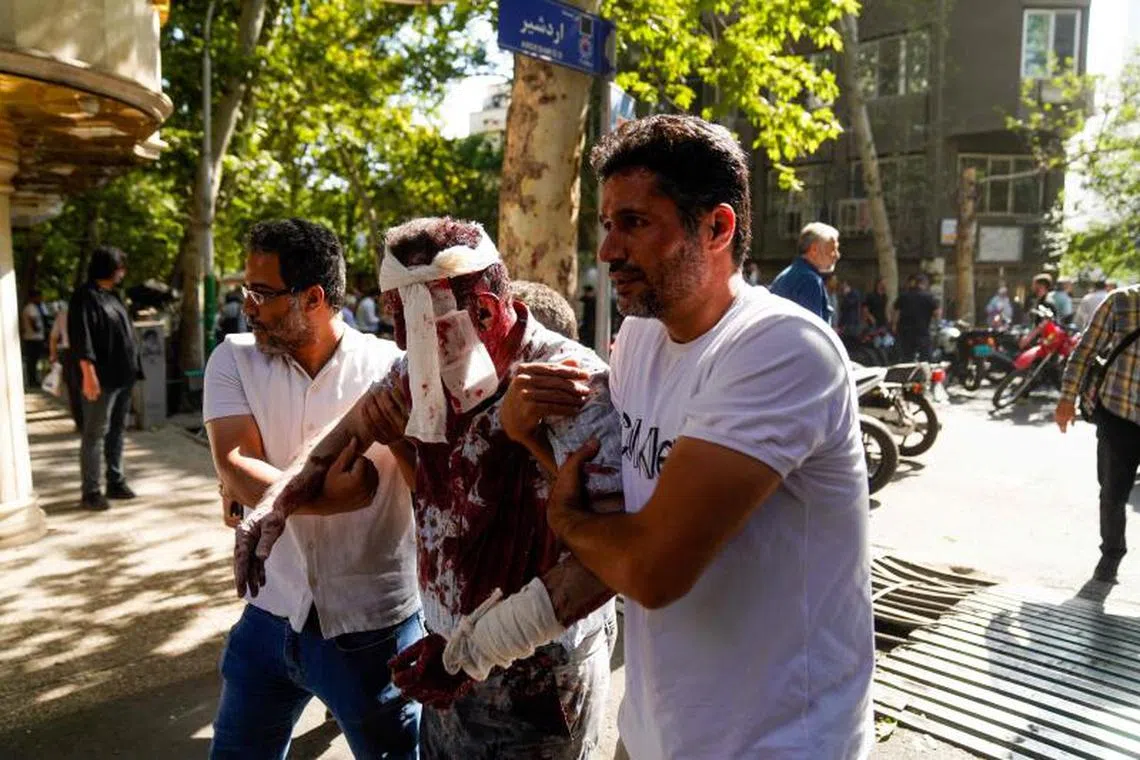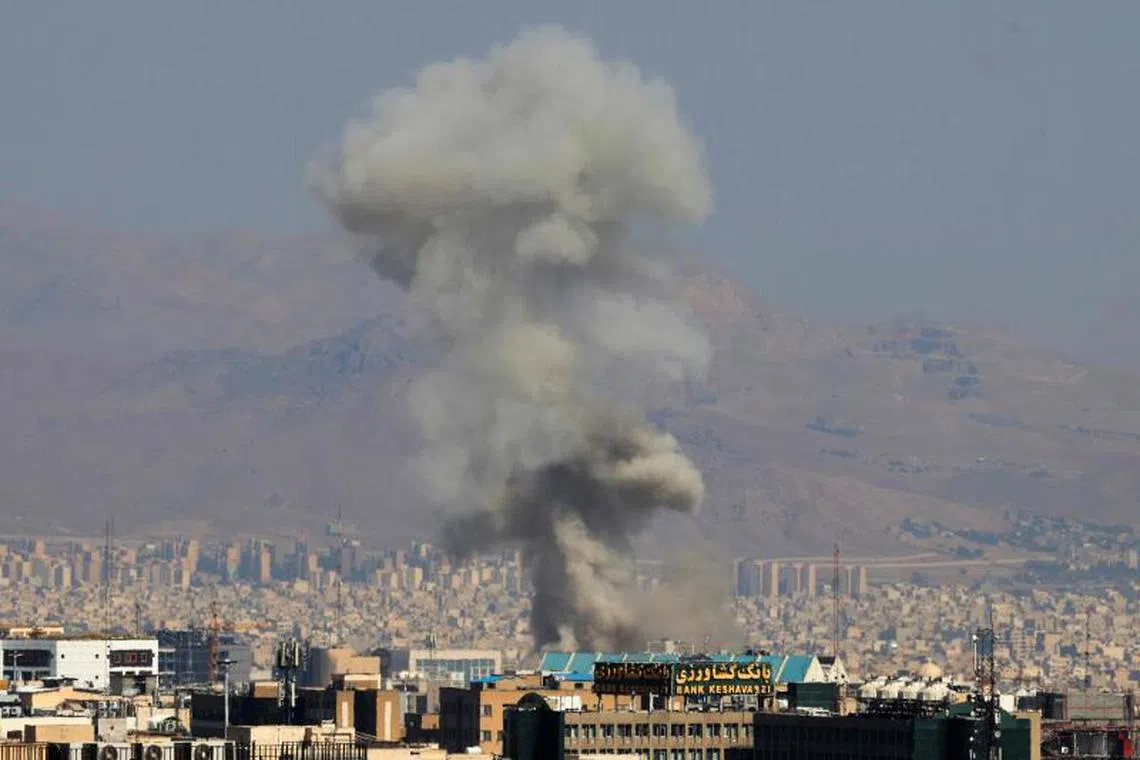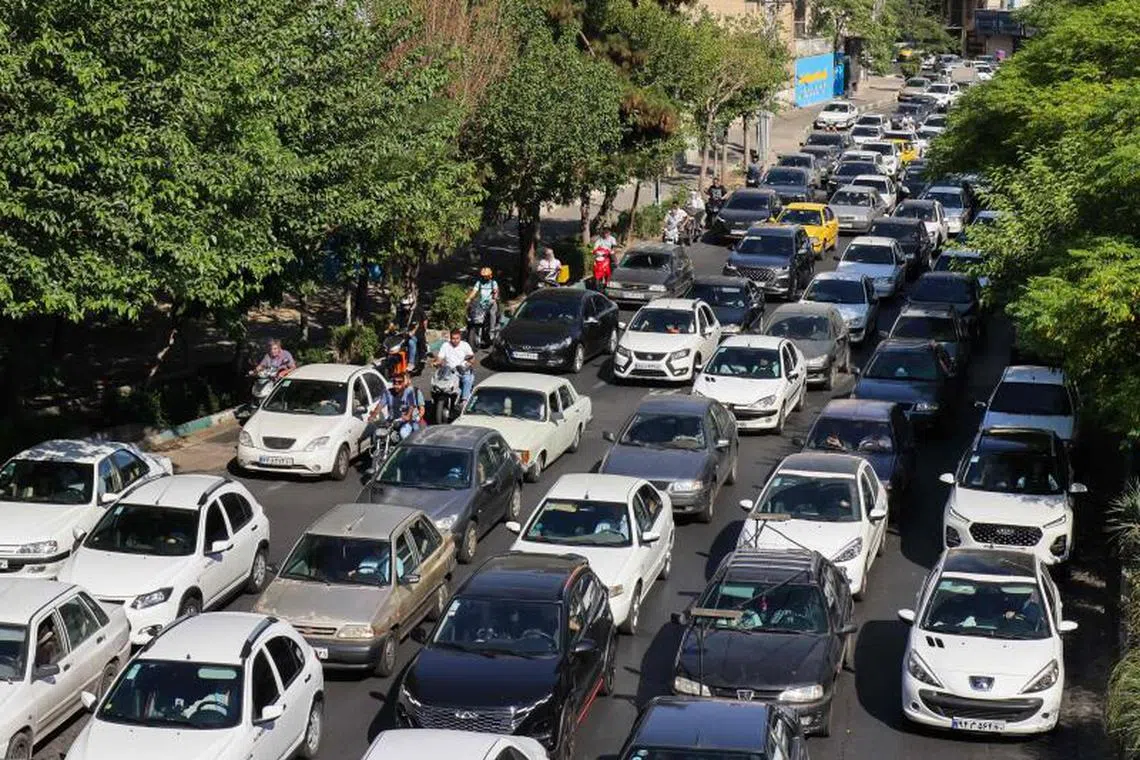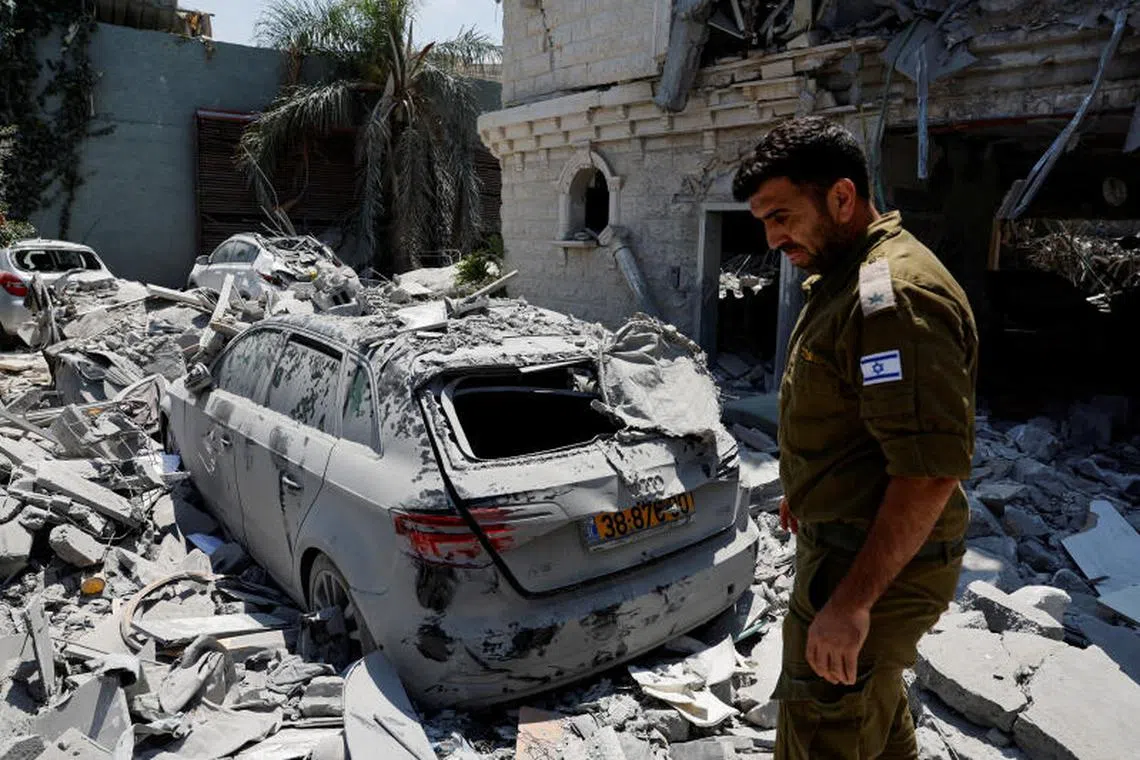Israel pounds Iran from west to east in deepest strikes yet
Sign up now: Get ST's newsletters delivered to your inbox

Iranian residents helping a man injured in an Israeli strike on Keshavarz Boulevard in downtown Tehran on June 15.
PHOTO: AFP
TEHRAN – Israel unleashed a punishing wave of strikes across the breadth of Iran on June 15 and Tehran hit back with fresh missile barrages, as both sides threatened more devastation in a conflict that appeared to be intensifying.
After decades of enmity and a prolonged shadow war fought through proxies and covert operations, the latest conflict marks the first time the arch-enemies have traded fire with such intensity, triggering fears of a lengthy conflict that could engulf the entire Middle East.
Israeli authorities told citizens to head to shelters in advance of incoming missiles on June 15, while Iran said it would begin opening mosques, metro stations and schools to serve as makeshift refuges as Israel kept up its withering strikes.
Israel says its attacks have hit military and nuclear facilities, and killed top officers and atomic scientists, but a senior US official said on June 15 that President Donald Trump had told Israel to back down from a plan to kill Iran’s Supreme Leader, Ayatollah Ali Khamenei.
Meanwhile, residential areas in both countries have suffered deadly strikes since the hostilities broke out two days ago, with Israeli Prime Minister Benjamin Netanyahu on June 15 slamming Iran for allegedly targeting civilians
“Iran will pay a very heavy price for the premeditated murder of civilians, women and children,” he said during a visit to the site of a missile strike on a residential building in the coastal city of Bat Yam, near Tel Aviv.
The remarks came hours after overnight Iranian missile fire killed at least 10 people, according to the authorities, pushing the death toll in Israel up to 13 since Iran began its retaliatory strikes on June 13.
More missiles followed over the course of the day, with the Israeli military saying in the evening that search and rescue teams were dispatched to “several” sites that were hit.
Iranian state television, meanwhile, reported at least five people killed on June 15 by an Israeli strike that hit a residential building in downtown Iran.
Colonel Reza Sayyad, a spokesman for Iran’s armed forces, threatened a “devastating response” to Israel’s attacks.
“Leave the occupied territories (Israel) because they will certainly no longer be habitable in the future,” he warned in a televised address, adding that shelters will “not guarantee security”.
Iran’s Health Ministry reported at least 224 people killed and more than 1,200 wounded in Israeli attacks since June 13.
On June 15, Israel’s military said its air force hit Mashhad airport in Iran’s far east, making it the longest-range strike of the conflict, with the target “approximately 2,300km from Israel”.

Smoke billowing after an explosion in central Tehran on June 15. Iranian media said an Israeli strike hit the Tehran police headquarters in the city centre.
PHOTO: AFP
An Israeli strike also killed intelligence chief Mohammed Kazemi of Iran’s Revolutionary Guards, along with two other officers, Iran’s official Irna news agency reported.
‘I will not leave’
A heavy cloud of smoke hung above Tehran after Israeli aircraft struck two fuel depots there. Local media outlets also reported an Israeli strike on the police headquarters in the city centre.
“We haven’t been able to sleep since Friday because of the terrible noise,” said a Tehran resident who gave her name as Farzaneh.
“Today they hit a house in our alley, and we were very scared. So we decided to leave Tehran and head to the north of the country.”

Vehicles waiting in traffic as people left Tehran through an artery in the city’s west on June 15.
PHOTO: AFP
Some residents, however, were determined to stay put.
“It is natural that war has its own stress, but I will not leave my city,” Mr Shokouh Razzazi, 31, told AFP.
AFP images from the Israeli city of Haifa, meanwhile, also showed a column of smoke rising on June 15 evening after an Iranian missile barrage.
The military said rescue teams “have been dispatched to several hit sites in Israel”, while the fire services reported rescuers heading to a building on the coast that sustained a “direct hit”.
Earlier in the day, in Bat Yam, first responders wearing helmets and headlamps picked through a bombed-out building after a deadly overnight strike.
“There was an explosion and I thought the whole house had collapsed,” said Bat Yam resident Shahar Ben Zion.
“It was a miracle we survived.”

An Israeli soldier standing near a damaged vehicle after missiles fired from Iran hit a residential building in Tamra, northern Israel, on June 15.
PHOTO: REUTERS
‘Make a deal’
Mr Trump said Washington “had nothing to do” with Israel’s bombing campaign.
But he also threatened to unleash “the full strength and might” of the US military if Iran attacked American interests, later urging the two foes to “make a deal”.
A senior US official told AFP on June 15 that Mr Trump had urged Israel to drop a plan to assassinate Mr Khamenei.
“We found out that the Israelis had plans to hit Iran’s Supreme Leader. President Trump was against it and we told the Israelis not to,” said the US official, speaking on condition of anonymity.
Asked in an interview with Fox News whether regime change in Iran was one of the objectives of Israel’s strikes, Mr Netanyahu said that “it certainly could be the result, because the Iran regime is very weak”.
Iran’s top diplomat Abbas Araghchi maintained Tehran had “solid proof” that US forces had supported Israel in its attacks.
He also told a meeting of foreign diplomats that Iran’s actions were a “response to aggression”.
“If the aggression stops, naturally our responses will also stop,” he added.
Iran scrapped nuclear talks with the United States
The Iranian media reported on June 15 that police had arrested two suspects over alleged links to Israel’s Mossad spy agency.
Israel, in turn, said it had taken two individuals into custody over alleged links to Iranian intelligence. AFP


